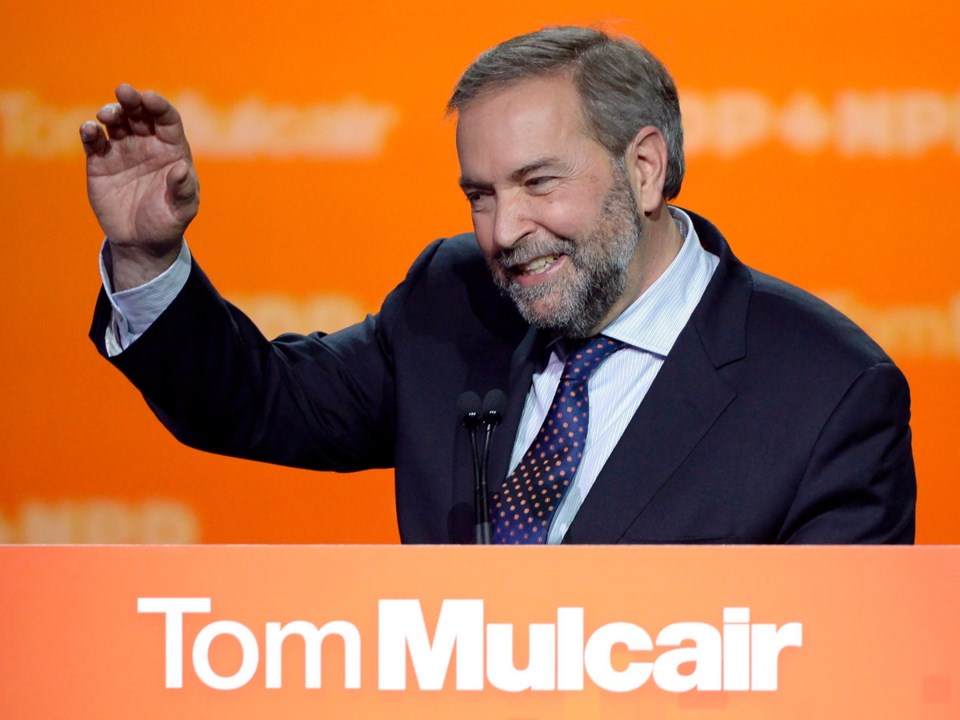 The other thing that happened Monday night was the collapse of the federal New Democratic Party, and the free-form analysis going around the legislature of that event was enough to make your head spin.
The other thing that happened Monday night was the collapse of the federal New Democratic Party, and the free-form analysis going around the legislature of that event was enough to make your head spin.
Because the NDP is essentially one party that encompasses both federal and provincial wings, B.C. politicians use the results to pass judgments of sorts on the provincial scene.
The party lost 59 seats, plunging from its record-high seat count of 103 in the 2011 election to just 44 after Monday’s count. Its share of the popular vote dropped by 13 points, to 20 per cent from 33 per cent. More than a million NDP votes from 2011 dispersed elsewhere, most of them obviously to the Liberals.
The most obvious impact is that NDP Leader Thomas Mulcair will be getting a polite but firm eviction notice from Stornoway, the official residence of the leader of the Opposition. (He can console himself with the fact that a Conservative will be moving in.)
The NDP is back in the space it has occupied for most of its existence, a third party with a few dozen MPs, firmly on the sidelines. But provincial New Democrats were determined to see the bright side. They did that by shrugging off the national vote and concentrating on B.C., where the national party picked up two seats to hold 14 out of 42. Even there, they have to squint a bit to shade out more bad news, as the share of the popular vote dropped to 26 per cent from 32.5 per cent.
Holding a third of the seats in B.C. and fielding a 44-person caucus nationally would be a middling grade for Mulcair’s leadership in normal times. But two things turn it into a D.
The first was the massively inflated expectation that developed after the breakout performance in 2011. The sea change in Quebec and the dynamic leadership of the late Jack Layton earned them 59 seats there in 2011. But even with a Quebec leader, they couldn’t hold it. The NDP seat count dropped to 16 and that 43-seat difference represents most of their losses across Canada.
The second was the fact Mulcair had a sizable lead in the early going and lost it all by himself. They not only went into the campaign with more than 100 seats, they led it for about half the time. That makes the results taste even more bitter.
Provincial NDP figures are consoling themselves with the fact the party is left with a “solid” 16-seat base in Quebec. But nothing is really solid in Quebec, or anywhere else. And they have to acknowledge that the 2011 results amounted to a mirage to find any satisfaction in Monday’s numbers. Which leads to views such as: It’s the best showing for the NDP ever, if you don’t count 2011.
NDP Leader John Horgan said the new Liberal government is “more closely aligned with my values than the current government here in B.C., in terms of the notion of investing rather than restraint.”
“I’m delighted the country voted for change in massive numbers and that’s good news for me, too, because in 2017 there’s going to be a desire for change.”
On the NDP numbers, he said the net pickup of two seats was “a good outcome for us.”
Also making the best of a bad situation are federal and provincial Greens. They were talking at one point about a dozen or more seats and counting on a strong turnout. They got a big turnout, but leader Elizabeth May still lost her only caucus mate, an NDP floor-crosser — and now reverts to flying solo. Greens also dropped to 3.4 per cent of the popular vote, a half-point down from 2011 and the lowest share in 15 years.
Despite May’s lock on her riding and strength elsewhere on the Island, Greens are down 330,000 votes from 2008.
Just So You Know: Tuesday’s column stated that Premier Christy Clark’s father ran unsuccessfully for the federal Liberals in the 1960s and ’70s. Actually, it was the provincial Liberals. My apologies.



